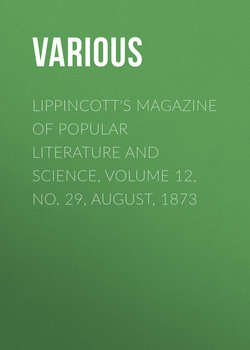Читать книгу Lippincott's Magazine of Popular Literature and Science, Volume 12, No. 29, August, 1873 - Various - Страница 5
ON THE CHURCH STEPS
CHAPTER II
ОглавлениеThe next day was Sunday, and I was on duty at an early hour, prepared to walk with Bessie to church. My darling was peculiar among women in this: her church-going dress was sober-suited; like a little gray nun, almost, she came down to me that morning. Her dress, of some soft gray stuff, fell around her in the simplest folds, a knot of brown ribbon at her throat, and in her hat a gray gull's wing.
I had praised the Italian women for the simplicity of their church-attire: their black dresses and lace veils make a picturesque contrast with the gorgeous ceremonials of the high altar. But there was something in this quiet toilet, so fresh and simple and girl-like, that struck me as the one touch of grace that the American woman can give to the best even of foreign taste. Not the dramatic abnegation indicated by the black dress, but the quiet harmony of a life atune.
Mrs. Sloman was ready even before Bessie came down. She was a great invalid, although her prim and rigid countenance forbore any expression save of severity. She had no pathos about her, not a touch. Whatever her bodily sufferings may have been—and Bessie dimly hinted that they were severe to agony at times—they were resolutely shut within her chamber door; and when she came out in the early morning, her cold brown hair drawn smoothly over those impassive cheeks, she looked like a lady abbess—as cold, as unyielding and as hard.
There was small sympathy between the aunt and niece, but a great deal of painstaking duty on the one side, and on the other the habit of affection which young girls have for the faces they have always known.
Mrs. Sloman had been at pains to tell me, when my frequent visits to her cottage made it necessary that I should in some fashion explain to her as to what I wanted there, that her niece, Bessie Stewart, was in nowise dependent on her, not even for a home. "This cottage we rent in common. It was her father's desire that her property should not accumulate, and that she should have nothing at my hands but companionship, and"—with a set and sickly smile—"advice when it was called for. We are partners in our expenses, and the arrangement can be broken up at any moment."
Was this all? No word of love or praise for the fair young thing that had brightened all her household in these two years that Bessie had been fatherless?
I believe there was love and appreciation, but it was not Mrs. Sloman's method to be demonstrative or expansive. She approved of the engagement, and in her grim way had opened an immediate battery of household ledgers and ways and means. Some idea, too, of making me feel easy about taking Bessie away from her, I think, inclined her to this business-like manner. I tried to show her, by my own manner, that I understood her without words, and I think she was very grateful to be spared the expression of feeling. Poor soul! repression had become such a necessity to her!
So we talked on gravely of the weather, and of the celebrated Doctor McQ–, who was expected to give us an argumentative sermon that morning, until my argument came floating in at the door like a calm little bit of thistledown, to which our previous conversation had been as the thistle's self.
The plain little church was gay that morning. Carriage after carriage drove up with much prancing and champing, and group after group of city folk came rustling along the aisles. It was a bit of Fifth Avenue let into Lenox calm. The World and the Flesh were there, at least.
In the hush of expectancy that preceded the minister's arrival there was much waving of scented fans, while the well-bred city glances took in everything without seeming to see. I felt that Bessie and I were being mentally discussed and ticketed. And as it was our first appearance at church since—well, since—perhaps there was just a little consciousness of our relations that made Bessie seem to retire absolutely within herself, and be no more a part of the silken crowd than was the grave, plain man who rose up in the pulpit.
I hope the sermon was satisfactory. I am sure it was convincing to a brown-handed farmer who sat beside us, and who could with difficulty restrain his applauding comment. But I was lost in a dream of a near heaven, and could not follow the spoken word. It was just a quiet little opportunity to contemplate my darling, to tell over her sweetness and her charm, and to say over and again, like a blundering school-boy, "It's all mine! mine!"
The congregation might have been dismissed for aught I knew, and left me sitting there with her beside me. But I was startled into the proprieties as we stood up to sing the concluding hymn. I was standing stock-still beside her, not listening to the words at all, but with a pleasant sense of everything being very comfortable, and an old-fashioned swell of harmony on the air, when suddenly the book dropped from Bessie's hand and fell heavily to the floor. I should have said she flung it down had it been on any other occasion, so rapid and vehement was the action.
